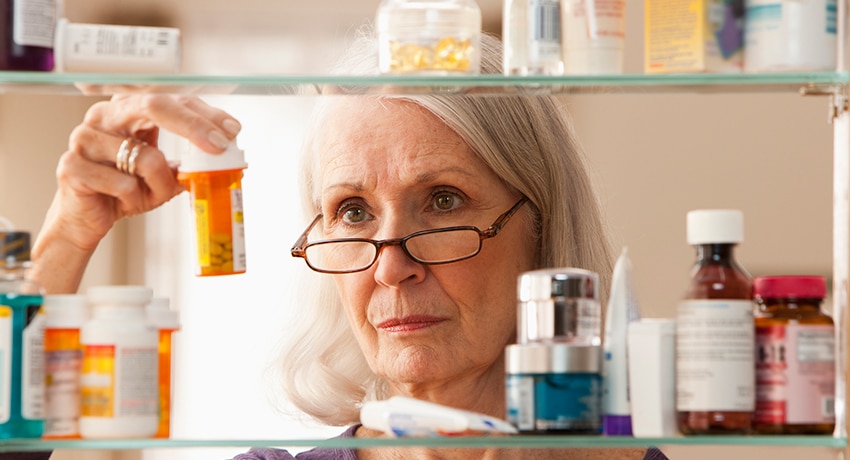When it comes to a home medicine cabinet, lighter is better, said Pio Juan Lansangan, PharmD, clinical pharmacist supervisor with UT Physicians.
The fewer medicines you have, he says, the safer. Disposing of old medicine not only protects yourself but also others in your home. You can protect them from ingesting medicine they don’t need or that is expired, which could cause adverse reactions or an accidental overdose.
Why is it important to dispose of old medicine?
“Medicines past the expiration date have no guarantee for safety and efficacy. This is particularly true for medicines like antibiotics,” said Lansangan.
Medicines that are past the expiration date have no guarantee for safety and efficacy.
Pio Juan Lansangan, PharmD, clinical pharmacist supervisor, UT Physicians
“While it is always recommended to complete antibiotics as prescribed, some people may end up with leftover antibiotics for a variety of reasons. These leftover antibiotics may prove to be problematic because if a person gets a new illness later on, this person may think “Oh, I still have a bottle of a previous antibiotic. I could use that instead of seeing a doctor.” This is simply not safe for many reasons. For one, the illness may be completely different. Additionally, if the antibiotic is expired, you risk taking a subtherapeutic dose which could promote antibiotic resistance,” he explained.
Don’t flush your medications
Getting rid of unwanted or expired medicine in an appropriate manner isn’t always clear, but you do have options, said Scott Patlovich, DrPH, assistant vice president of environmental health and safety with UTHealth Houston.
“In the past, there was a perception that you could simply flush any medication down the toilet and that’s absolutely not the case anymore,” said Patlovich, referencing guidance from the Food and Drug Administration that indicates flushed medication could contaminate our water supply. “Disposing of medicine the right way ensures it does not contaminate our water system.”
More than 100 pharmacies in the Houston area, from CVS and Walgreens to Walmart, Randalls, and Sam’s Club, are authorized by the Drug Enforcement Agency (DEA) to offer year-round prescription take-back.
How to dispose of medicine
Getting rid of expired or unwanted medicine at home is easy, too. The Environmental Protection Agency offers this guide for disposing of medicine at home.
- Take the medicine out of the original container
- Mix the drugs with an undesirable substance like dirt, cat litter, or coffee grounds
- Put that mixture into a disposable container like a sour cream tub or sealable bag
- That container with the drug mixture can go into household trash
- Remove the label on your prescription container or cover it and throw that away in household trash
Annual cleanout

Removing unwanted and expired medication, whether over-the-counter or prescription, is an important yearly task all homes should follow.
“Think about people and safety first to ensure no medication gets into the wrong hands. Whether it’s curious children or people who wish to take those things nefariously, we want to prevent medicine from causing harm,” said Patlovich.
The DEA also sponsors a National Prescription Take Back Day each year in October. Be on the lookout for more information about the 2024 event soon. In the meantime, here is some information about the October 2023 effort across the country.
What should I do with sharps?
For homes in the State of Texas that use injectable medications, lancets for finger pricks, or other sharps, Lansangan says those sharps should always be placed in a heavy-duty plastic container like an empty laundry detergent container. He says to only fill it with needles and other sharps about 3/4 full, secure the lid tightly, and then use duct tape to seal it. Write the words “sharps” and “do not recycle” on the exterior as a warning before throwing it out in household trash.
“Our waste collectors and other individuals may easily get injured from needles that are incorrectly thrown away in household trash,” said Lansangan. “This is why we must follow the proper procedures for disposing of needles, for public safety.”


